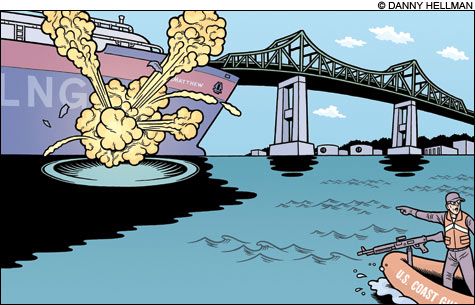If terrorists hit Boston: In The Edge of Disaster, a security expert warns that the US is not prepared for future disasters
By STEPHEN FLYNN March 7, 2007 4:41:43 PM
What follows is a scenario roughly based on two real-world post-9/11 terrorist attacks: one on the French oil tanker Limburg off the coast of Yemen in October 2002, the other on Iraq�s Khor Al-Amaya and al-Basra oil terminals in April 2004. The operating premise is this: terrorist operations that are undertaken on foreign shores will ultimately find their way to our shores. The characters are fictional, but they are based on the profiles of real individuals apprehended over the past two years by European authorities. All the details on the ports where the hypothetical attacks take place come from open-source information, nearly all of which can be found by way of searches on the Internet . . . .
The nation that led �the crusader alliance� and that was most responsible for advancing the cult of the individual and the secularization of modern society had been unbloodied on its own soil since 9/11. Why should the group not follow the example of Khalid Sheikh Mohammed, who had masterminded the audacious strikes on New York and Washington?
But this time, instead of an attack from the air, they should strike the infidels from the sea, as their Yemeni counterparts had done against the USS Cole in October 2000. If a small boat laden with conventional explosives could blow a 40-by-40-foot gash in the hull of the Cole, imagine what a shaped charge would do to a ship carrying liquefied natural gas or oil! The October 2002 suicide bombing of the 1090-foot French tanker Limburg had set it on fire, spilling 90,000 barrels of oil into the Gulf of Aden. Osama bin Laden had observed that �by striking the oil tanker in Yemen with explosives, the attackers struck at the umbilical cord of the Christians.� Instead of the cord, why not target the womb, by bombing a tanker inside a US harbor?
 SITTING DUCK: The Norwegian-operated tanker Matthew regularly ferries 30 million tons of liquefied natural gas under the Tobin Bridge.
SITTING DUCK: The Norwegian-operated tanker Matthew regularly ferries 30 million tons of liquefied natural gas under the Tobin Bridge.Nabih � one of the British nationals � responded that while Khalid�s idea was both audacious and appealing, there were practical issues that would have to be addressed. The group had proven themselves in battle on land, but conducting an attack at sea was more complicated. A shaped charged had not yet been used against a ship, and it would be difficult to practice attack techniques without attracting attention. The Americans had been investing in port security, so they would need to investigate the measures that were in place that might raise the risk of failure. Nabih said they were all ready to die for martyrdom, but such sacrifice was justifiable only if they could be successful in carrying out the mission.
More:
http://www.thephoenix.com/article_ektid35111.aspx